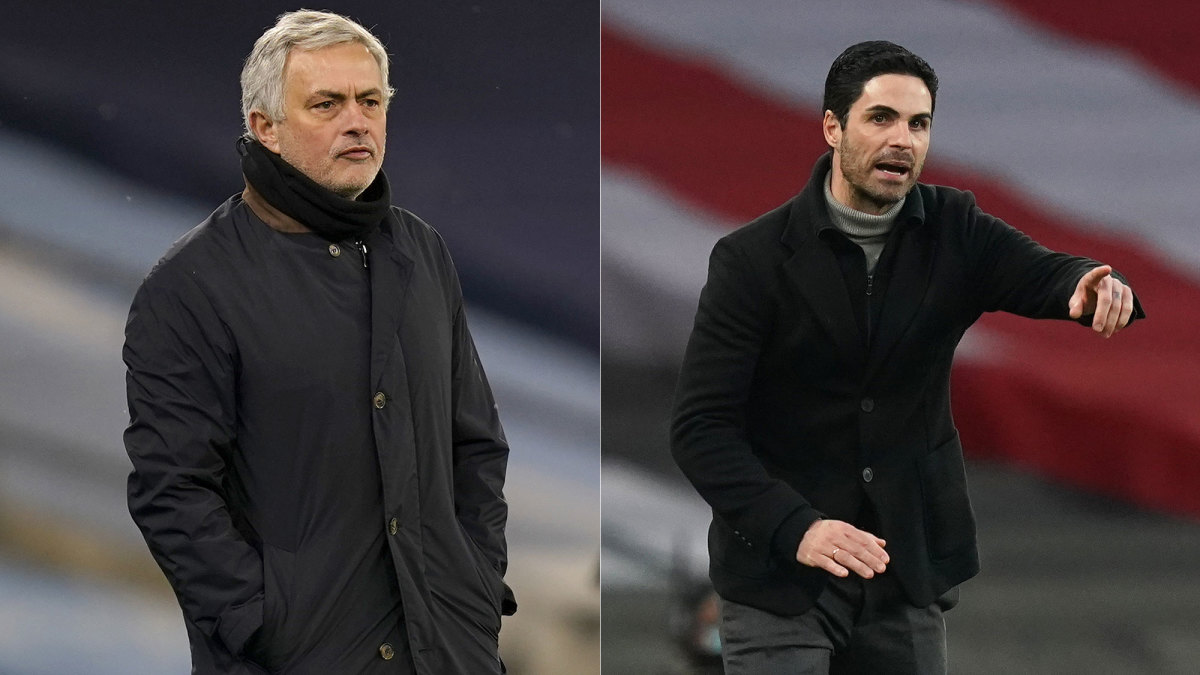For Tottenham, Arsenal It's All In on the Europa League
As of Friday, with roughly two-thirds of the Premier League season done, Tottenham sits ninth in the table, Arsenal 11th. Tottenham is nine points behind West Ham in fourth (with a game in hand), with Arsenal two further back. With the two north London giants progressing from the round of 32 in the Europa League this week, realistically for both, winning the Europa League is the most likely route in to next season’s Champions League. It's time to go all in.
Friday's last-16 draw has been relatively kind for both. Tottenham would be hopeful of beating Dinamo Zagreb and, while Olympiakos eliminated Arsenal from last season’s Europa League on away goals in the round of 32, Mikel Arteta will know the next test could have been far sterner. Best of all, perhaps, is that arguably the two best sides left in the competition, AC Milan and Manchester United, were pitted against each other.
🔥 Round of 16 draw! 🔥
— UEFA Europa League (@EuropaLeague) February 26, 2021
Best game? 🤩#UELdraw pic.twitter.com/LlPsMyZjgo
José Mourinho has been here before. Victory over Ajax in the Europa League final in Stockholm in 2017, allowed him to end his first season at Man United in a least some sort of glory, as Mourinho strutted around with three fingers raised to denote his "treble" of Community Shield, League Cup and Europa League.
“It would,” he said, reflecting on the Europa League toward the end of that season, “be a good achievement given the problems this season and would allow us to be back in the Champions League next season, so the Europa League has now become for us more important.”
It was, of course, preposterous hypocrisy. Four years earlier, shortly after taking over at Chelsea, Mourinho had openly mocked Rafa Benítez’s achievement in winning the Europa League the previous season.
“I don't want to win the Europa League,” Mourinho said then. “It would be a big disappointment for me. I don't want my players to feel the Europa League is our competition.”

But Mourinho now is definitely in 2017 rather than 2013 mode. It feels, already, a year early, as though he has entered the doom spiral so familiar in his third season at clubs. The days when it seemed Tottenham might, in this weirdest of seasons, be a genuine title contender feel like a long time ago. Spurs have lost five of their last six in the league, the worst run of form of Mourinho’s career. There is a lifelessness about them, and they are desperately reliant on Harry Kane and Son Heung-min. Mourinho, meanwhile, has begun the process of shifting blame, each post-match press conference used to make clear this isn’t his fault.
That Tottenham’s squad was growing stale was clear when Mauricio Pochettino was ousted in November 2019. The gamble then was that Mourinho would be able to re-energize them without the need for immense expenditure. Despite $120 million net spend on transfers in the three windows since, that has not happened. Worse, leaks have emerged that players are unhappy with training. This is the same pattern that happened at Real Madrid, at Chelsea and at United.
For Tottenham, the calculation already seems clear. Releasing Mourinho now would reportedly cost in the neighborhood of $50 million (so much for Daniel Levy’s supposed skill as a negotiator). But with a new stadium to pay off, with a squad of increasingly disillusioned players perhaps contemplating the exit, with the prospect of no Champions League football next season, at a certain point does replacing him become the less costly option?
Spurs are in the League Cup final vs. Manchester City, although winning that this season would offer only a place in the new, third-tier Europa Conference League. But given the club has already had to take out an emergency $220 million loan from the Bank of England to see it through the pandemic, realistically getting in only to the Champions League could make this season anything other than financially hugely damaging—and the easiest way to do that appears to be by winning the Europa League.
If Arsenal’s position is not quite so acute, it’s only because it has already done its failing. Nobody doubted when Mikel Arteta took over that there was a huge amount of work to be done, and that’s why the club's patchy form has been largely accepted—although fans may not be so patient were they actually in the stadium. Arsenal at least has a raft of emerging young players, which eases the financial pressure to an extent, but the danger is that without Champions League football, the likes of Bukayo Saka and Emile Smith Rowe will soon start to wonder whether it makes sense for them to stay at the club.
Last season, Arsenal won the FA Cup, but its only hope of silverware this season is the Europa League. Winning it would offer some sort of validation, just as the FA Cup did last season, a reassurance that things are moving in the right direction. But even more valuable would be the route it offers to the Champions League, its prestige and its revenue streams.
